- Clone
- H8A5 (See other available formats)
- Regulatory Status
- RUO
- Other Names
- Interleukin-8, Neutrophil activating protein-1, Monocyte-derived neutrophil chemotactic factor (MDNCF), Neutrophil activating factor (NAF), Leukocyte adhesion inhibitor (LAI), Granulocyte chemotactic protein (GCP), CXCL8
- Isotype
- Mouse IgG2a, κ
- Ave. Rating
- Submit a Review
- Product Citations
- publications
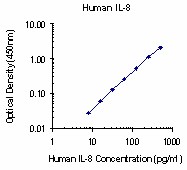
| Cat # | Size | Price | Quantity Check Availability | Save | ||
|---|---|---|---|---|---|---|
| 511501 | 50 µg | £73 | ||||
| 511502 | 500 µg | £193 | ||||
IL-8, also known as neutrophil chemotactic factor, neutrophil activating protein, and monocyte-derived neutrophil chemotactic factor, is a member of the alpha (C-X-C) subfamily of chemokines called CXCL8. In response to proinflammatory stimuli, IL-8 is produced by monocytes, macrophages, T cells, neutrophils, and fibroblasts. IL-8 promotes neutrophil chemotaxis and degranulation. The 72 amino acid IL-8 is the predominant form secreted by monocytes and lymphocytes. The H8A5 antibody recognizes the human IL-8 protein and has been shown to be useful for intracellular immunofluorescence flow cytometric analysis and as ELISA capture antibody.
Product DetailsProduct Details
- Verified Reactivity
- Human
- Antibody Type
- Monoclonal
- Host Species
- Mouse
- Formulation
- Phosphate-buffered solution, pH 7.2, containing 0.09% sodium azide.
- Preparation
- The antibody was purified by affinity chromatography.
- Concentration
- 0.5 mg/ml
- Storage & Handling
- The antibody solution should be stored undiluted between 2°C and 8°C.
- Application
-
ELISA Capture - Quality tested
- Recommended Usage
-
Each lot of this antibody is quality control tested by ELISA assay. For ELISA capture applications, a concentration range of 2-6 µg/ml is recommended. To obtain a linear standard curve, serial dilutions of IL-8 recombinant protein ranging from 2000 to 15 pg/ml are recommended for each ELISA plate. It is recommended that the reagent be titrated for optimal performance for each application.
- Application Notes
-
ELISA Detection: The purified H8A5 antibody is useful as the capture antibody in a sandwich ELISA assay, when used in conjunction with the biotinylated E8N1 (Cat. No. 511404) antibody as the detection antibody.
Note: For testing human IL-8 in serum or plasma, BioLegend's ELISA Max™ Sets are specially developed and recommended. -
Application References
(PubMed link indicates BioLegend citation) - Product Citations
-
- RRID
-
AB_893455 (BioLegend Cat. No. 511501)
AB_893456 (BioLegend Cat. No. 511502)
Antigen Details
- Structure
- CXC chemokine; 8.4 kD (Mammalian)
- Ligand/Receptor
- CXCR1 (CDw128); CXCR2
- Bioactivity
- Neutrophil/basophil chemoattractant; activates neutrophils, angiogenic factor
- Cell Sources
- Monocytes, lymphocytes, granulocytes, fibroblasts, endothelial cells, bronchial epithelial cells, keratinocytes, melanocytes, hepatocytes, mesangial cells, chondrocytes
- Cell Targets
- Neutrophils, basophils, lymphocytes
- Cell Type
- Tregs
- Biology Area
- Cell Biology, Immunology, Neuroinflammation, Neuroscience
- Molecular Family
- Cytokines/Chemokines
- Antigen References
-
1. Fitzgerald K, et al. Eds. 2001. The Cytokine FactsBook. Academic Press San Diego.
2. Baggiolini M, et al. 1994. Adv. Immunol. 55:97.
3. Schröder J, et al. 1992. Immunology Ser. 57:387.
4. Zwahlen R, et al. 1993. Intl. Rev. Expt. Pathol. 34:27. - Regulation
- Upregulated by IL-1, IL-7, IL-17, IFN-γ, TNF-α, leukoregulin; downregulated by IL-4, TGF-ß, glucocorticoids, vitamin D3
- Gene ID
- 3576 View all products for this Gene ID
- Specificity (DOES NOT SHOW ON TDS):
- IL-8
- Specificity Alt (DOES NOT SHOW ON TDS):
- IL-8
- App Abbreviation (DOES NOT SHOW ON TDS):
- ELISA Capture
- Hidden Names (DOES NOT SHOW ON TDS):
- chemokine
- UniProt
- View information about IL-8 on UniProt.org
Related FAQs
Other Formats
View All IL-8 Reagents Request Custom Conjugation| Description | Clone | Applications |
|---|---|---|
| Purified anti-human IL-8 | H8A5 | ELISA Capture |
Customers Also Purchased
Compare Data Across All Formats
This data display is provided for general comparisons between formats.
Your actual data may vary due to variations in samples, target cells, instruments and their settings, staining conditions, and other factors.
If you need assistance with selecting the best format contact our expert technical support team.
 Login / Register
Login / Register 







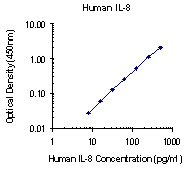
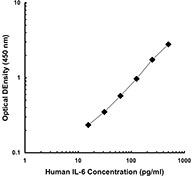
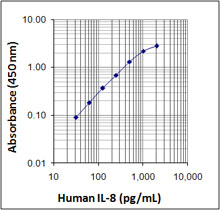
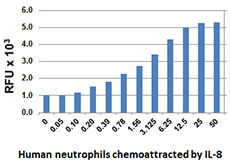
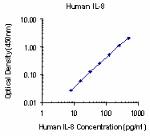



Follow Us